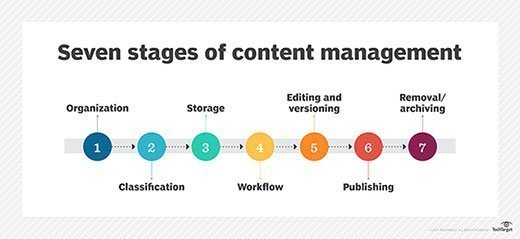content management (CM)
Content management (CM) is the process for collection, delivery, retrieval, governance and overall management of information in any format. The term is typically used in reference to administration of the digital content lifecycle, from creation to permanent storage or deletion. The content involved may be images, video, audio and multimedia as well as text.
Content management process
Content management practices and processes can vary by purpose and organization. This can lead to differences in steps or terminology.
The stages of the content management lifecycle are the following:
- Organization. The first stage where categories are created, taxonomies designed and classification schemes developed.
- Creation. Content is classified into architectural categories.
- Storage. Content format and storage decisions are made based on ease of access, delivery, security and other factors dependent on the organization's needs.
- Workflow. Rules are designed to keep content moving through various roles while maintaining consistency with the organization's policies.
- Editing/versioning. This step involves managing multiple content versions and presentation changes.
- Publishing. The stage where content is delivered to users, which can be defined as website visitors or internal publishing via the Intranet for employees.
- Removal/archives. The final stage where content is deleted or moved to an archive when it is infrequently accessed or obsolete.

Content governance
Content governance provides content creators with structure and guidelines. Digital content management governance can help determine priorities, provide detailed standards, assign ownership for content and provide access control. This helps to create a consistent user experience, minimize content bloat and create internal controls.
Common governance tools that organizations use include content workflows, taxonomies and style guides, along with records management tools which include audit trails for compliance.
Types of digital content management
For just about every category of digital content, there is a corresponding tool or process for managing it.
- Social media content management. Social media content management tools help to create an organized social media marketing strategy with defined goals and to analyze engagement. Some social media content management systems include Sprout Social, Google Analytics and BuzzSumo.
- Web content management. Web content management is used to create, manage and display webpages. A web content management system (WCMS) is a program that provides organizations with a way to manage digital information on a website without prior knowledge of web programming and can include components for a specific industry, such as a content management application (CMA) that automates the production of HTML.
- Mobile content management. Mobile content management (MCM) provides secure access to corporate data on smartphones, tablets and other devices. The main components of MCM are file storage and file sharing.
- Enterprise content management. An enterprise content management (ECM) system has components that help enterprises manage data effectively. ECM components are geared to goals such as streamlining access, eliminating bottlenecks and minimizing overhead, along with version control, routing, archiving, content governance and security.
Content management systems and tools
In addition to content management platforms for specific content types, there are also general content management systems (CMS) which provide automated processes for collaborative digital content management and creation.
A CMS commonly includes features such as format management, publishing functionality and the ability to update content. A CMS can allow a user to create a unified look and have version control, but a downside is that it often can require specific training for content creators. A digital asset management (DAM) system is another type of CMS that manages documents, movies and other rich media assets. A few examples of notable CMSes are WordPress, Joomla and Drupal.
Editor's note: This article was written by Karolina Kiwak in 2017. TechTarget editors revised it in 2022 to improve the reader experience.








